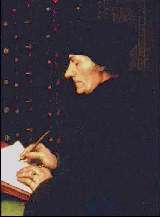
Born: October 26 or 27, between 1466 and 1469, in Rotterdam, Holland
Died: July 12, 1536, in Basel, Switzerland
Desiderius Erasmus' was the illegitimate son of a priest, Roger Gerard. His mother was the daughter of a physician. His early years were spent in Holland where he was attended school in the cities of Gouda, Deventer and Utrecht.
Erasmus and his brother passed into the custody of a guardian when his mother died of the plague followed shortly after by his father. Their principal guardian was Peter Winckel, a schoolmaster who furthered the education of Erasmus and his brother. Each of the brothers was eventually sent to a monastery to continue their education and prepare for life in the priesthood.
Erasmus obtained the position of secretary to the Bishop of Cambrai after he was ordained in 1492. He attended the University of Paris for four years starting in 1495 but was discouraged when his early writings failed to attract much attention.
In the time from 1499 to 1517, Erasmus made several extended trips to England. During these trips he was invited to lecture at Oxford and Cambridge and became acquainted with several prominent writers of the time including Thomas More, John Fisher and John Colet. It was Colet, the dean of St. Paul's, who encouraged Erasmus to devote his energies to the creation of works on theology.
During this period, a work that he had completed years before, The Adagia, was published. This extensive collection of proverbs from classical authors established Erasmus within the theological and artistic communities.
In between two of his trips to England, Erasmus spent three years in Italy. During this time, he received a doctorate in theology from Turin and completed the book, The Praise of Folly. While it was his most famous book, he produced another excellent satire, Colloquies, in 1516 and created an uproar when he published his Latin edition of the New Testament. His work with the new testament had great influence over religious reformers of the time.